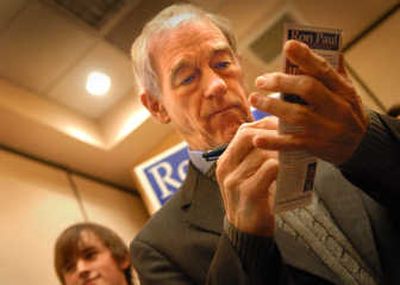Ron Paul clicks with Spokane crowd

U.S. Rep. Ron Paul may be having limited success in presidential contests in recent weeks, but his campaign message of more freedom, less government and an immediate end to the war in Iraq was a huge hit with a Spokane crowd Thursday evening.
An estimated 900 people who packed a ballroom at the downtown Doubletree Hotel shouted approval when he warned that government spending was weakening the country and creating “a nanny state.” They cheered raucously when he called for bringing troops home.
“There’s no need to be fighting all these wars,” he said. “What we need to do is bring the troops home as soon as possible.”
To those who might argue that would result in chaos in Iraq, he countered: “What’s over there now?”
People who say the war must continue are the same ones who were wrong in saying that Saddam Hussein had ties to al-Qaida and weapons of mass destruction, and that Iraqi oil would pay for the war, Paul added.
While this may sound like standard criticism of the Bush administration from a Democratic presidential candidate, Paul is seeking the Republican nomination.
As part of that effort, Paul and his campaign urged supporters in the room to attend the Washington state precinct caucuses Feb. 9, the start of the selection of delegates in Washington state.
There’s also a Republican presidential primary on Feb. 19, and the party will use both to award delegates.
But members of the Paul campaign were focused on the caucuses Thursday in an effort to repeat the success of another unlikely Republican candidate in 1988.
In that year, supporters of the Rev. Pat Robertson stunned GOP regulars by turning out at caucuses in large numbers across the state, electing delegates to their county conventions and sticking with the process through the state convention.
The Texas congressman’s speech Thursday was a mix of peace and populism, fiscal conservatism and limited government.
The crowd, some of whom had driven into the city on bad roads and waded across downtown intersections that more resembled slushy ponds, appreciated his message.
“Freedom is popular,” he told the cheering crowd. “It brings people together.”
He returned frequently to foreign policy and the war in Iraq, at one point contending the nation needs to learn a lesson from the 1960s and ‘70s and its experience in the Vietnam War.
Americans elected a president in 1968 because they wanted to end the war, but the war continued for years until America eventually lost.
“We lost and we had to come home, and it was an utter tragedy,” Paul said.
But the consequences were not as predicted, all the dominoes didn’t fall and the world didn’t slip into communism, he said. Today the United States trades with Vietnam, and China not only is a major trading partner but it holds much of our debt.
The United States should heed the words of the Founding Fathers, avoid foreign wars and seek only trading alliances, he said.
Since Sept. 11, 2001, Americans have had their freedoms curtailed, with enhanced airport security, warrantless searches and laws allowing people to be jailed as enemy combatants, Paul said.
There’s a debate in Washington, D.C., whether a practice known as waterboarding is torture, he said. Anyone who thinks it isn’t should volunteer to try it, he suggested.
The country should abolish the income tax, return to money that is backed by gold and silver, and eliminate the Federal Reserve Board, Paul said.
Although the economy is hurting, it should not bail out the mortgage industry in the current housing crisis.
Instead, it should let the economy work itself out, which might cause difficult times for some people for a year or so, but would result in a stronger country in the end, Paul said.
Bringing U.S. troops home from all foreign stations would boost the economy, he said, because it would result in them, and the country, spending money in America that is being spent overseas.
“We want peace and we want prosperity and we don’t want perpetual war,” he said.